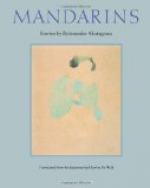|
This section contains 13,284 words (approx. 45 pages at 300 words per page) |

|
SOURCE: “Akutagawa Ryunosuke,” in Modern Japanese Writers and the Nature of Literature, Stanford University Press, 1976, pp. 111–44.
In the following essay, Ueda discusses Akutagawa's interest in literary criticism and the representation of the artist's life in his short stories.
Akutagawa Ryūnosuke (1892–1927) was a writer who could easily have become a scholar or literary critic. An extremely self-conscious man, he never failed to criticize the artist within himself, usually with unforgiving scrutiny. Naturally the basic problems of art and artist are abundantly reflected in his works. “The Hell Screen,” a masterpiece of his early period, centers on a painter caught between the conflicting demands of life and art. Kappa, a major work of his later years, has a poet, an aphorist, and two composers among its main characters. A sizable number of his other major pieces, such as “Absorbed in Letters,” “Withered Fields,” “Genkaku Sanbō,” “Cogwheel,” and “A Fool's...
|
This section contains 13,284 words (approx. 45 pages at 300 words per page) |

|


